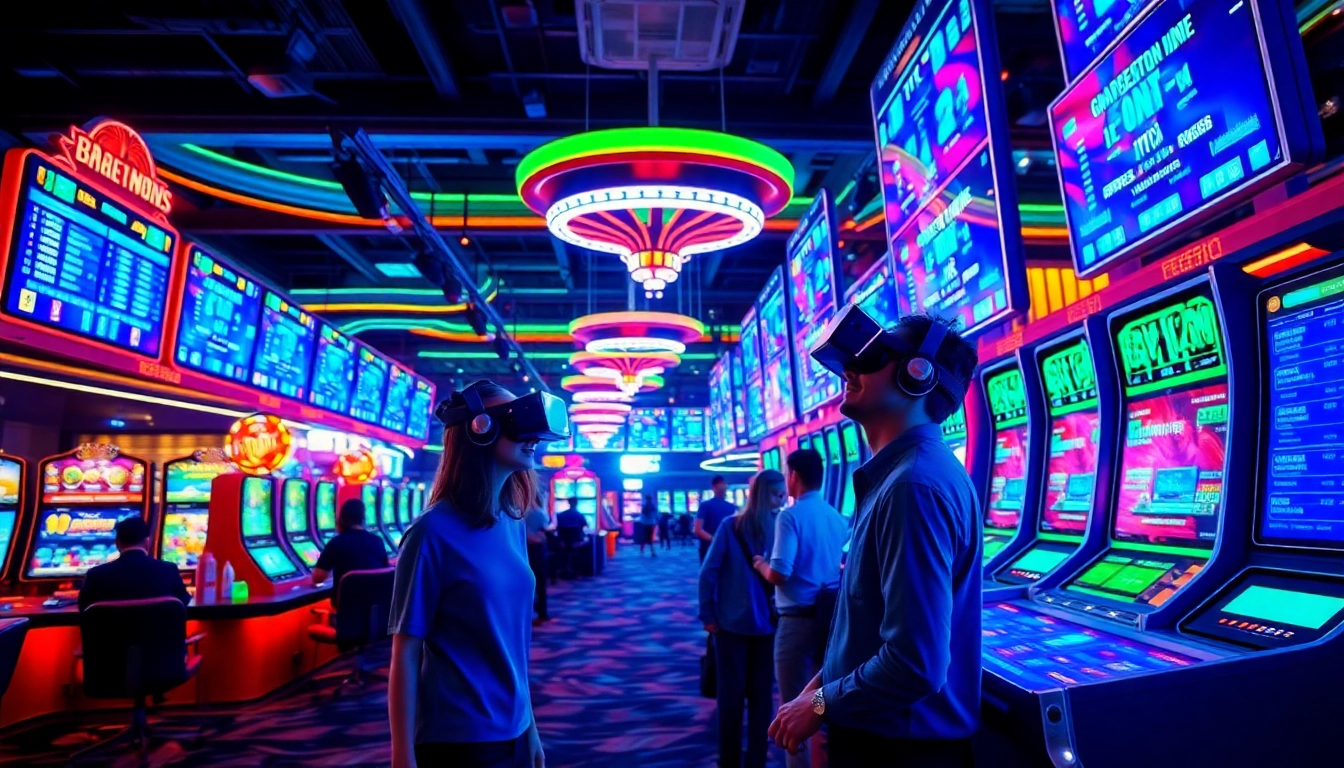New Technology: 5 Essential Gambling Innovations for 2025

Understanding New Technology in Gambling
In recent years, the gambling industry has seen an unprecedented transformation spurred by various New Technology innovations. As gamblers increasingly seek more engaging and immersive experiences, operators are compelled to adapt through technological advancements. This shift not only affects how games are played but also how the entire gambling ecosystem functions.
The Evolution of Gambling Innovations
The journey of gambling technology dates back centuries. However, the rapid advancement of technology has accelerated innovation. Initially, gambling was strictly the realm of physical casinos, but with the arrival of the internet, this landscape began to change drastically. The first online casinos emerged in the mid-1990s, revolutionizing how players accessed games. As technology continued to evolve, so did gambling methods, with innovations including live dealer games, mobile betting apps, and the emergence of cryptocurrency as a payment option.
Key Technologies Reshaping the Industry
Several key technologies are fundamentally reshaping the gambling industry:
- Artificial Intelligence (AI): AI plays a pivotal role in gaming strategies, customer insights, and responsible gambling initiatives. With the power of machine learning algorithms, operators can analyze vast amounts of data to improve user experiences and personalize gaming offerings.
- Blockchain: This technology offers transparency and security in transactions, establishing trust in the gambling environment. Blockchain is especially significant with the rise of cryptocurrencies, which have become viable alternatives for placing bets.
- Augmented Reality (AR) and Virtual Reality (VR): AR and VR are enhancing user experiences by creating immersive environments where players can interact with games in ways previously unimaginable. These technologies allow users to feel more engaged and invested in their gameplay.
User Experience and New Technology Integration
As technology progresses, user experience in gambling has taken center stage. Gamblers are now expecting seamless interactions, fast loading times, and intuitive interfaces. The integration of AI-driven chatbots provides instant customer support, ensuring that players receive assistance whenever needed. Moreover, the use of gamification techniques is becoming prevalent, making gambling activities more engaging by incorporating levels, achievements, and rewards.
The Role of Artificial Intelligence in Modern Gambling
AI Algorithms and Betting Strategies
AI algorithms have transformed betting strategies, enabling bettors to make data-driven decisions. Sportsbooks utilize AI to forecast outcomes using historical data and real-time analytics. By analyzing patterns and player behavior, AI can determine the best betting odds and identify potential arbitrage opportunities. The continued use of AI is likely to enhance predictive analytics in gambling further, providing more sophisticated and reliable betting options.
Enhancing Customer Support with AI
Modern gambling platforms now leverage AI for enhanced customer support. AI chatbots can quickly respond to user queries, handle common issues, and guide users through processes without human intervention. This leads to improved customer satisfaction and reduced wait times, fostering a more positive gaming experience for users.
Data Analysis and Personalization in Gaming
Understanding player behavior through data analysis allows gambling operators to tailor experiences to individual preferences. By analyzing patterns in betting behavior, casinos can offer personalized game recommendations, promotions, and bonuses, keeping players engaged and increasing customer loyalty.
Emerging Trends: The Future of Casino Technology
Blockchain and Cryptocurrency in Gambling
Blockchain technology has revolutionized online gambling by providing players with greater security and transparency. With its decentralized nature, blockchain allows for efficient and secure transactions, which are essential in the gambling sector. Coupled with cryptocurrencies like Bitcoin and Ethereum, users can enjoy enhanced anonymity and lower transaction fees. The integration of smart contracts also automates processes, ensuring fair play and integrity across all gaming activities.
The Rise of Mobile and Online Betting Platforms
The global shift towards mobile technology has influenced how users engage with gambling. Mobile betting apps have gained popularity due to their convenience, enabling players to place bets at any time and from anywhere. As mobile technology continues to advance, features such as live betting, streaming, and in-app live interactions are set to enhance user engagement.
Impact of Augmented Reality on Game Design
Augmented Reality is transforming game design within casinos, creating immersive experiences that blend real life and digital elements. By allowing players to enhance their gaming experience with interactive features, AR games are creating dynamic environments. For example, some casinos have introduced AR poker games where cards can be scanned and displayed on players’ devices, merging virtual elements with traditional gameplay.
Implementing New Technology: Challenges and Solutions
Barriers to Adoption in Traditional Casinos
Despite the clear benefits of new technology, traditional casinos often face barriers to adoption. Resistance to change, high initial costs, and the complexity of integration can hinder technological advancements. Many operators are entrenched in their established practices, which can delay the implementation of innovative solutions. To overcome these challenges, casinos must foster a culture of innovation and embrace technological change as a necessity for remaining competitive.
Regulatory Challenges with New Tech
The gambling industry is heavily regulated, and the introduction of new technology can bring with it a myriad of compliance challenges. Ensuring that new offerings adhere to existing laws can be complex, especially as regulations vary significantly across jurisdictions. To address these regulatory concerns, operators must work closely with legal advisors to develop transparent and compliant technology solutions that meet gaming regulations globally.
Best Practices for Smooth Implementation
Successful implementation of new technologies in gambling requires a strategic approach. Here are some best practices:
- Stakeholder Engagement: Involve all relevant stakeholders, including employees, management, and technology partners, in the planning stages to ensure buy-in and address concerns.
- Incremental Rollouts: Begin with pilot programs to test new technology before full implementation. This allows for adjustments based on feedback.
- Training and Support: Provide comprehensive training to staff on new technologies and maintain support channels to address any user issues that arise.
Measuring Success with New Technology in Gambling
Key Performance Indicators for Tech Innovations
To gauge the success of new technology initiatives, operators must define and track relevant Key Performance Indicators (KPIs). Common metrics include user engagement rates, customer acquisition costs, and return on investment. For example, if a newly implemented mobile app increases engagement by 30% compared to the previous year, it indicates successful integration of technology.
User Feedback: The Role of Surveys and Analytics
Understanding user feedback is critical in assessing the effectiveness of new technologies. Implementing feedback mechanisms such as surveys and analytics can provide valuable insights into user preferences and pain points. This information helps operators refine their offerings, ensuring that they meet user demands effectively.
Adjusting Strategies Based on Data Insights
Data-driven decision-making is essential for optimizing technology strategies. Operators should continuously analyze performance data, adjusting marketing tactics, gamification strategies, and customer engagement methods based on trends and insights. By remaining agile and adaptive, gambling operators can effectively navigate the changing landscape of the industry.






